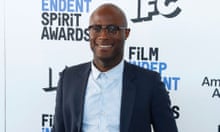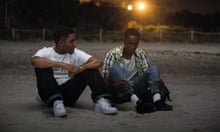Barry Jenkins first heard the history of the Underground Railroad from a teacher when he was six or seven years old. The school lesson described the loose network of safe houses and abolitionists that helped enslaved people in the American south escape to free states in the north in the 19th century. Jenkins as a wide-eyed kid imagined an actual railroad, though, secret steam trains thundering under America, built by black superheroes in the dead of night. It was an image, he recalls, that made “anything feel possible”. “My grandfather was a longshoreman,” he says. “He came home every day, in his hard hat and his tool belt, and his thick boots. And I thought, ‘Oh, yes, people like my granddad, they built this underground railroad!’”
That childhood image returned to Jenkins, now 41, when he read an advance copy of Colson Whitehead’s novel about that history, which builds on that same seductive idea. That was in 2016. Both Jenkins and Whitehead were on the edge of career-defining breakthroughs: Jenkins’s film Moonlight was about to be released (and would go on to win the Oscar for best picture) and Whitehead’s book The Underground Railroad was about to be published (going on to receive the National Book Award and the Pulitzer prize). All this was to come, though, when the pair met. “I was familiar with Colson as an author,” Jenkins told me last week on a screen from his home in Los Angeles. “And once I read his book, I knew for sure I absolutely want this. And I’m not that guy. Usually I’ll read something and I go, well, that might make a great film, and then I’ll just leave it. But this one, it’s all hands on deck, we have to get this.”
Five years on, the 10 parts of Jenkins’s harrowing and luminous adaptation of Whitehead’s book, a masterpiece of storytelling, are about to be streamed on Amazon. One of the first things Jenkins shot in the series was a steam train in an underground tunnel (built at a train museum in Savannah, Georgia). Jenkins has Cora, the young woman escaping a plantation, climb through a trapdoor and down to the tracks, as in Whitehead’s novel. He then allows the viewer to see that scene through his six-year-old eyes. Cora crouches down to touch the steel rail just to make sure it’s for real. “Because as a kid,” Jenkins says, “I know that’s what I would have done.”
The closer he got to this project after the success of Moonlight, and his adaptation of the James Baldwin novel, If Beale Street Could Talk, the more Jenkins says he got frightened of the trauma embedded in the material, of doing it justice. “There’s always fear,” he says, “but with this one in particular, this is the most triggering material I’ve ever had to wrestle with. There’s a great responsibility that comes with that. I hope it can recontextualise rather than reinforce stereotypes about my ancestors, that have been allowed to persist over the decades.”
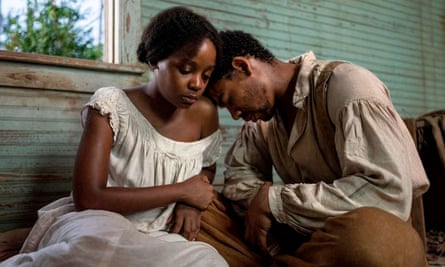
In 2017, when he had just beaten La La Land to the Oscar, friends questioned whether he still needed to make this series, when so many less complex opportunities had opened up for him. He was adamant about it, though, not least because of the political moment. At the time he was optioning the rights to Whitehead’s book, Donald Trump’s racially divisive election campaign was in full swing. “This phrase, ‘Make America Great Again’, just kept getting repeated and repeated,” Jenkins says. “And the thing I always heard in that was this cavity, this vacuum [in knowledge]. Because maybe America has never been great. There’s been great progress at certain times in American history. But there’s always been this dark side. And so I thought, okay, yes, [The Underground Railroad] is absolutely the right thing to do. Because clearly, if this slogan is powerful enough to elect a man to the highest office in the land, then there’s still this huge vacuum…”
The chapters of Whitehead’s book, its structure as a semi-mythic American odyssey, made it perfect for the “box set” medium. As Cora – played with extraordinary empathic presence by the young South African actor Thuso Mbedu – makes her way through various stations and states and shifting historical territory, pursued by the bounty hunter Ridgeway, she can sometimes seem 16 and sometimes 60. Each staging post of her journey – Georgia, South and North Carolina, Tennessee – becomes like a feature film in its own right. They shot the 450 pages of Jenkins’s script in 116 days, “kind of a breakneck pace”, he says. They were fortunate to be just about done when lockdown was first imposed last March.
That propitious timing looked like further proof that the director is a living example of that old maxim “the harder I work, the luckier I get”. Looking back at his career it is tempting to reach for ideas of fate to describe its arc. After film school at Florida State University his low-budget first feature Medicine for Melancholy received good notices but proved hard to follow. He was thinking of ways of writing about his own damaged childhood when a friend sent him the script of an autobiographical play by Tarell Alvin McCraney, written a decade earlier. McCraney had been at the same junior school as Jenkins, in Liberty City, a tough suburb of Miami, one year below him. The pair had never met, though the details of their upbringing were uncannily similar: both had mothers whose lives were destroyed by the crack cocaine epidemic that hollowed out Liberty City. Like McCraney, Jenkins was raised in precarious and surrogate households, in his case mostly by an older woman he called his grandmother. When Moonlight came out he told the Guardian: “There were seven or eight of us in a two-bed apartment. There was usually food but sometimes not. The lights usually worked, but sometimes not.”
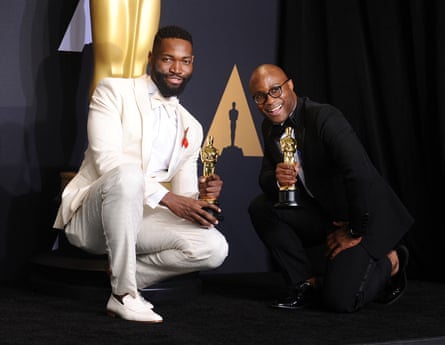
If Jenkins was unsure how to confront these issues on film, McCraney’s play provided him with the answer, a story close to his own, but not his own. There was a further twist to the tale when the director, struggling to raise finance, was invited at the last minute to chair a Q&A after a screening of 12 Years a Slave with its director, Steve McQueen, and co-producer, Brad Pitt. When afterwards Pitt asked in passing what Jenkins was working on, he seized the moment to sell the idea of Moonlight to Pitt’s production company, Plan B.
Jenkins’s initial route out of his damaged childhood in Liberty City had been as an American footballer – playing on an unbeatable high school team alongside seven future NFL players. This helped him to an academic scholarship at Florida State University, where he eventually found a home at the film school. He plays down his prowess as an athlete, but talking to him you have a sense of exactly the kind of player he might have been – high energy, quietly, irrepressibly determined, breaking through tacklers twice his size.
Looking back, he doesn’t disagree that both fortune and fortitude played equal roles in his story. I wonder, given the deeper history that his series addresses, if he has been moved to fill in more of the gaps in his own family’s backstory?
He says not; though he has toyed with the idea of pursuing genealogy or trying to get a DNA analysis, he is not sure how far it would get him. “My personal familial history is very complicated,” he says. “I have no idea who my ‘real’ father is. And my mom was, to some degree, a runaway. She had a very rough life as a child growing up in South Carolina, and then migrated down to Miami.” As he made the series he fully realised that such fracturing was a common thread in the lives of The Underground Railroad. “Going back,” he says, “it was very much systematically part of the process that if [an enslaved woman] gave birth to a child, the child will be taken away from her.”
I have never seen a portrayal of that history that brings home so forcefully the horrible truth that babies of enslaved women were considered the property of plantation owners from birth. That fact is set alongside other depictions of the full brutality of that system. The first episode of the series contains some of the most graphic punishment and torture, including a scene in which a man, Big Anthony, who attempts to escape the plantation, is hung up by his wrists and flayed and burned.

Jenkins was surprised, he says, of the extent to which the retelling of that history affected him. “There’s no blood, there’s no fire on set,” he says. “And yet, we were on an actual plantation in Georgia. And as we’re recreating some of these moments, this feeling seeps into your body that things like this happened here. And even worse things. There was an ethical component to filming those scenes that isn’t normally a part of the process.”
There was a full-time therapist on the set, on hand to help any member of cast or crew who found it hard to process the depicted trauma. “Quite a few people spoke to her,” Jenkins says. Before the most horrific scene, Benjamin Walker, the actor who plays the psychopathic plantation owner Terrance Randall, paused, and he took out his phone. “He said, ‘Do you mind if I just call my kids in London and tuck them in? Before we start this?’ And the production assistant who’s sitting next to him is like, ‘Nope, sorry, sorry, but we have to get going.’ I went up and said, ‘Let him call his kids.’ So that he can reaffirm that he is a good person and is not this person.”
Often, he says, they would start out by asking what is the least voyeuristic version of the scene for the audience? He often recalled something that Jean-Luc Godard once said in depicting the Holocaust: that the true horror was brought home not by the gas chambers but by watching their operators go home afterwards and sit at the dining table and ask their children what kind of day they’d had. Jenkins made sure, for example, there’s not a single moment where you see a whip contacting flesh. “The sound is enough.” He captures some of the worst horrors in the faces of witnesses to the torture. Even so, after he called cut on the scene with Big Anthony, he says, “For the first time in my career, I just walked off set without telling anyone where I was going.” After a little while collecting his thoughts, he returned and they continued the work.
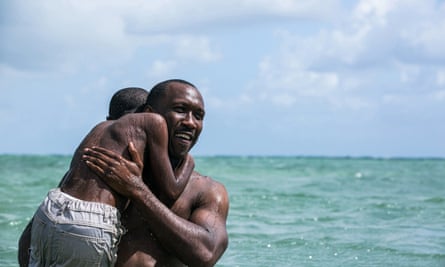
I wonder how much he was aware of the daily noise of Trump’s America invading the set?
“Because we were in the state of Georgia, which Trump won in the 2016 election, it was red caps all around, you know. It was hard to avoid. We had to shut down because of Covid on 12 March, then we didn’t go back for the last four days of production until late September. So much happened in the world between March and September. And going back to production for those last four days, going back to the state of Georgia, that was intense.”
Watching this series reminds you that Jenkins was not born when Alex Haley’s Roots was published and televised, a moment that seemed to mark an important public reckoning with America’s buried history, drawing a TV audience of 130 million. Given that his series is appearing while the arguments of Black Lives Matter still feel very urgent, (not to mention, during the January riot, the appalling sight of confederate flags and a hangman’s noose at the Capitol building), does he believe that this series could have a comparable impact?
He says his grandma had an old VHS recorder and there were only two choices of cassette: Roots or The Color Purple. “Maybe,” he wonders, rhetorically, “because such a massive audience showed up for Roots, maybe it makes this show unnecessary?” He has a quick answer to that question. “You know, just the fact that Kanye West could go to TMZ in 2018, and say slavery was a choice, without adding context to that statement, kind of reaffirms to me that telling these stories is still necessary.”
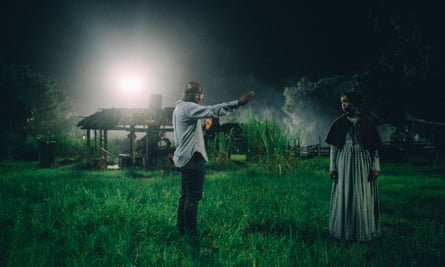
The day on which we are speaking is the day after the verdict in the George Floyd murder trial that saw police officer Derek Chauvin convicted on all counts. Had that felt like a rare moment of optimism for Jenkins?
“You know,” he says, “in my 41 years, which is relatively young, I still feel like I’ve seen so many damn things. Maybe I could allow myself to have optimism. But, you know, literally, as that verdict was being read, another young teenager was shot by the police. It was like, just for a moment maybe there is hope, and five minutes later that was extinguished. Maybe we can alter or abolish the systems of policing that have become so ingrained, which have their roots in people like this character Ridgeway [the slave hunter in the series]. It’s hard to be optimistic. Though my show does have a happy ending – or at least I think it does.”
That balancing sentiment of hope is hard won over his 10 episodes. He perceives it, however, in the “way that Colson threads the idea of parenting through the book – there are children everywhere in it, and we have added some more.” At the heart of it is the almost Dickensian figure of Cora, who believes she was abandoned in infancy by her mother, before going on a journey that helps her understand the sacrifices her mother made. Along the way, as well as recurrent trauma, she experiences what Jenkins sees as one of “the greatest acts of collective parenting” in human history. “Everywhere they landed, these people protected them. Everything my ancestors did was in service of the child.”
I wonder, in telling that story, how conscious he was in drawing on some of the emotions of his own childhood?
“Well,” he says, “I also felt abandoned by my mother for maybe the first 24 years of my life. And part of that was because, just like Cora, I had an incomplete history of what my mother had been through.” It was only later that he discovered more of the story of how his mother had been sexually abused, and become pregnant as a teenager, but still went on to find work in nursing and to raise three older children before crack took hold of her. “I thought that I was born and my mom just abandoned me because she suffered through this horrible addiction,” he says. “I never blamed her for it. But if I’m being honest, it was hard to not feel the sense of abandonment. So when I’m reading this book, I love that Colson allows Cora to be bitter, to be angry, because that is how that feels.” His job, he says, as a film-maker, is to show the other sides of that story, the full picture.
When he is doing so, does he acknowledge that he is also explaining his own childhood to himself?
He smiles. “I didn’t realise this show was about my mom until we were done,” he says. “I didn’t realise Moonlight was about my mom until we were done – I thought it was about Tarell’s mom. And I think that’s good because this stuff already takes a huge chunk of flesh out of you. It would take so much more if you knowingly went into it as ‘this is my personal therapy’. But I can’t deny that when I look across this work, you know, that’s what it is.”
As a film-maker Jenkins has a couple of times said there were always three stories he wanted to tell. One was to make a very personal story about where he grew up, that was Moonlight. Then he wanted to adapt James Baldwin, so he made If Beale Street Could Talk, and the third ambition was “to do something related to the condition of American slavery.” Does he have a sense of an ending now those three projects are complete?
“I certainly think I’m moving into a new phase of my work,” he says (future projects he has been attached to are as diverse as a biopic of the black choreographer Alvin Ailey and a prequel to Disney’s The Lion King). “But you know, if I drop dead tomorrow, I think I will be okay. I always felt like I had to use the privilege, the luck of stumbling into my calling, to tell these three stories.” He smiles. “If I never make anything else again, I will still feel like my journey was fulfilled.”
This article was amended on 10 May 2021 to correct the caption for the second image. It shows Aaron Pierre, not William Jackson Harper.
The Underground Railroad is available to watch on Amazon Prime from 14 May

